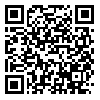Volume 4, Issue 1 (3-2020)
EBHPME 2020, 4(1): 64-73 |
Back to browse issues page
Download citation:
BibTeX | RIS | EndNote | Medlars | ProCite | Reference Manager | RefWorks
Send citation to:



BibTeX | RIS | EndNote | Medlars | ProCite | Reference Manager | RefWorks
Send citation to:
Khosravizadeh O, Shahsavari S, Ahadinezhad B, Asili Ansari F, Taheri R, Rafiei S. Spiritual Intelligence and Self-Efficacy among Operational Staff of Qazvin's Medical Centers: A Path Analysis. EBHPME 2020; 4 (1) :64-73
URL: http://jebhpme.ssu.ac.ir/article-1-262-en.html
URL: http://jebhpme.ssu.ac.ir/article-1-262-en.html
Omid Khosravizadeh 

 , Saeed Shahsavari
, Saeed Shahsavari 

 , Bahman Ahadinezhad
, Bahman Ahadinezhad 

 , Fahimeh Asili Ansari
, Fahimeh Asili Ansari 
 , Roohangiz Taheri
, Roohangiz Taheri 
 , Shoayb Rafiei *
, Shoayb Rafiei * 



 , Saeed Shahsavari
, Saeed Shahsavari 

 , Bahman Ahadinezhad
, Bahman Ahadinezhad 

 , Fahimeh Asili Ansari
, Fahimeh Asili Ansari 
 , Roohangiz Taheri
, Roohangiz Taheri 
 , Shoayb Rafiei *
, Shoayb Rafiei * 

Student Research Committee, Qazvin University of Medical Sciences, Qazvin, Iran , heydarrafiei@gmail.com
Abstract: (3081 Views)
Background: Self-efficacy and spiritual beliefs can be considered as strong motives for improving the quality of working. Due to the different job description and environment than other service sectors, medical centers need to pay attention to these factors. So, the present study is aimed at identifying the effect of spiritual intelligence components on self-efficacy among operational staff of Qazvin medical centers.
Methods: The present research is a descriptive-analytical and cross-sectional study conducted in 2019. About 238 people were selected by stratified sampling out of the medical centers staff in Qazvin, Iran. Spiritual intelligence was measured by King’s questionnaire including four dimensions, and self-efficacy was measured by Sherer’s questionnaires including three dimensions. Primary data analysis was done by Pearson’s correlation test in SPSS20 software, and path analysis was done by structural equation modeling in AMOS software with the significance level of 0.05.
Results: There was a significant direct relationship between all dimensions of self-efficacy and spiritual intelligence except persistence in the face of adversity and consciousness expansion (P-value ˂ 0.01). All the relationships were significant in path analysis of the final model. Also, the fit indices including NFI = 0.901, RMSEA = 0.055, GFI = 0.923, and
CFI = 0.913 suggest the good fitness of the final model.
Conclusion: The managers of the studied hospitals can promote
self-efficacy in clinical staff and improve their performance and behavior in service provision by psychological enrichment of the staff and raising their spiritual intelligence.
Methods: The present research is a descriptive-analytical and cross-sectional study conducted in 2019. About 238 people were selected by stratified sampling out of the medical centers staff in Qazvin, Iran. Spiritual intelligence was measured by King’s questionnaire including four dimensions, and self-efficacy was measured by Sherer’s questionnaires including three dimensions. Primary data analysis was done by Pearson’s correlation test in SPSS20 software, and path analysis was done by structural equation modeling in AMOS software with the significance level of 0.05.
Results: There was a significant direct relationship between all dimensions of self-efficacy and spiritual intelligence except persistence in the face of adversity and consciousness expansion (P-value ˂ 0.01). All the relationships were significant in path analysis of the final model. Also, the fit indices including NFI = 0.901, RMSEA = 0.055, GFI = 0.923, and
CFI = 0.913 suggest the good fitness of the final model.
Conclusion: The managers of the studied hospitals can promote
self-efficacy in clinical staff and improve their performance and behavior in service provision by psychological enrichment of the staff and raising their spiritual intelligence.
Type of Study: Original article |
Subject:
Healt care Management
Received: 2019/10/28 | Accepted: 2020/09/22 | Published: 2020/03/20
Received: 2019/10/28 | Accepted: 2020/09/22 | Published: 2020/03/20
Send email to the article author
| Rights and permissions | |
 |
This work is licensed under a Creative Commons Attribution-NonCommercial 4.0 International License. |




